Why Taiwan Matters
Why Taiwan Matters
Small Island, Global Powerhouse
Updated Edition
Shelley Rigger
ROWMAN & LITTLEFIELD PUBLISHERS, INC.
Lanham Boulder New York Toronto Plymouth, UK
Published by Rowman & Littlefield
4501 Forbes Boulevard, Suite 200, Lanham, Maryland 20706
www.rowman.com
10 Thornbury Road, Plymouth PL6 7PP, United Kingdom
Copyright 2011 by Rowman & Littlefield
All photos copyright 20052010 David Boraks
Epilogue to paperback edition 2014 by Rowman & Littlefield
All rights reserved . No part of this book may be reproduced in any form or by any electronic or mechanical means, including information storage and retrieval systems, without written permission from the publisher, except by a reviewer who may quote passages in a review.
British Library Cataloguing in Publication Information Available
The hardback edition of this book was previously cataloged by the Library of Congress as follows:
Rigger, Shelley, 1962
Why Taiwan matters : small island, global powerhouse / Shelley Rigger.
p. cm.
Includes bibliographical references and index.
1. TaiwanForeign relations21st century. 2. TaiwanForeign relationsUnited States. 3. United StatesForeign relationsTaiwan. 4. TaiwanForeign relationsChina. 5. ChinaForeign relationsTaiwan. 6. TaiwanEconomic conditions21st century. I. Title.
DS799.625.R54 2011
951.24'905dc22
2010051417
ISBN 978-1-4422-0479-9 (cloth : alk. paper)
ISBN 978-1-4422-0480-5 (pbk. : alk. paper)
ISBN 978-1-4422-0481-2 (electronic)
 The paper used in this publication meets the minimum requirements of American National Standard for Information SciencesPermanence of Paper for Printed Library Materials, ANSI/NISO Z39.48-1992.
The paper used in this publication meets the minimum requirements of American National Standard for Information SciencesPermanence of Paper for Printed Library Materials, ANSI/NISO Z39.48-1992.
Printed in the United States of America
Preface
Why Taiwan Matters is a book I have wanted to write for a long time. It answers the two questions I am asked most often about my work: What makes Taiwan so interesting to you? And, why is Taiwan such a big deal in U.S.-China relations?
I hope when you finish reading the book the first question will be answered. My goal is to give you an inkling of the excitement I feel every time I step off a plane at the Taoyuan International Airport. I felt that excitement for the first time in 1983 when I was a twenty-one-year-old college student embarking on a summer research project. I will never forget how bewildering, terrifying, and exhilarating it was to find myself standing alone with my suitcase on a hot, dusty sidewalk in Taipei, armed with nothing more than an envelope of travelers checks, a couple of telephone numbers, and four semesters of Chinese language instruction. Today, arriving in Taipei feels like returning to a second homebut it is a home where time accelerates and people cram three days of living into every twenty-four hours.
The second questionwhy does Taiwan matter so much to U.S.-China relations?is more complicated. Taiwan matters to the United States and other countries because it is an economic powerhouse that supplies much of our information-technology equipment and because it occupies a strategic niche in the Western Pacific. It is unique in the world in having all the attributes of a stateterritory, population, governmentexcept recognition by others. The Peoples Republic of China insists that history makes Taiwan part of China, and because the government in Beijing is the recognized Chinese state, it should rule the island. Few Taiwanese share that view, but there is a lively debate about how to fend off Beijings attentions. Navigating between the two sidesdeveloping amicable relations with China while supporting a democratic Taiwanis a challenging assignment for leaders in the United States and other countries.
Still, I hope to convince you that Taiwan is more than just a problem. Taiwan also matters because its history makes it a test case for values Americans and many others claim to cherish. For centuries, powerful countries treated Taiwan as war booty, an afterthought. In the past half century, Taiwans people rejected that status and stood up for themselves. In their determination to claim a better future, they created one of the worlds most successful economies and vibrant democracies. The United States has long encouraged free markets and democratic politics, both as a matter of national interest and as a reflection of its national values. Taiwan proves it is possible to achieve those ends peacefully, and to do so in a way that respects and enhances its turbocharged culture. For that, it matters.
Why Taiwan Matters is the culmination of all the work, all the reading, all the trips, all the interviews and encounters Ive had in nearly thirty years of traveling to Taiwan. Throughout the text, I include many quotations from people Ive talked to over the years, including hundreds of formal interviews and informal conversations. No one gets to know a place well without lots of help, but the student of Taiwan is especially blessed because hospitality, generosity, and conversation are (along with baseball and eating) national pastimes.
Thanking everyone who has helped me get to know Taiwan over the past thirty years would make the book unconscionably long, but there are a handful of people who have provided extraordinary support, encouragement, and information over the years. Chen Chu, the mayor of Kaohsiung, was the first public figure I met in Taiwan. Without her help, my efforts to learn about Taiwan politics would have come to nothing. Scores of Taiwanese, American and PRC officials, politicians, and activists have talked to me over the years, on and off the record. Those conversations shaped my views fundamentally. I also owe an enormous debt to my fellow political scientists, especially those in Taiwan, whose patience with a foreign scholars efforts to understand their homeland is humbling.
I have benefited from the scholarship of researchers in Taiwan, the PRC, the United States, Canada, Australia, and Europe, nine of whom rendered especially generous (and timely) service to this book at a critical moment: Richard Bush, Tun-jen Cheng, Dafydd Fell, Sara Friedman, Steven Phillips, Michael Szonyi, Alan Wachman, Vincent Wang, and Joseph Wong. And I thank my friend, guide, mentor, and confidant Fan Meei-yuan for making time for me in every visit.
Funding from the Smith Richardson Foundation made my work on this and other books possible, and I thank the foundation most sincerely. I have also received funding, administrative help, and bounteous encouragement from Davidson College. Thanks also to my research assistants: Shuo-ting Chen, August Ho, Yi-long Huang, and Aaron Saltzman.
Finally, I thank my traveling companions: David, Emma, and Tilly Boraks. You make every day an adventure.
Because Chinese is not a phonetic language, there is no one-to-one correspondence between Chinese characters and Roman letters. Spelling out Chinese words is a matter of deciding how they sound and writing down that sound as best we can. There are a number of systems for spelling Chinese words; the most popular is the pinyin system used in the Peoples Republic of China. Thats the system that gives us Beijing instead of the old Peking. Unfortunately, Taiwanese dont use any particular system consistently. As in so many realms of life, Romanization in Taiwan is, shall we say, democratic. In this book, I have not attempted to impose any order on the chaos of Taiwanese spelling, but instead have used the most popular spelling of each word. For place names I use the most familiar form; for personal names, I use the spelling preferred by the individual in question.
The Worlds Tallest Building
Taipei 101, the blue-green glass tower that reigned for six years as the worlds tallest building, is everywhere in Taiwan. Its image appears on advertisements, magazine covers, brochures, guidebooks, and billboards; the soaring structure itself is visible from nearly everywhere in Taipei City. As ubiquitous as Shanghais Oriental Pearl TV towerand considerably more gracefulTaipei 101 has become the iconic image of contemporary Taiwan.
Next page
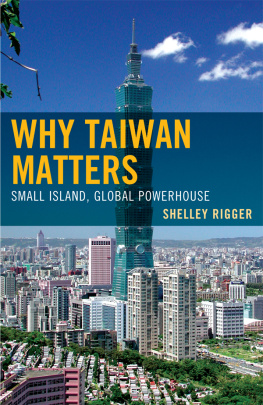
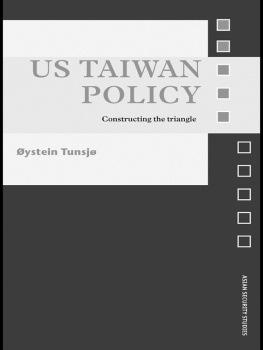
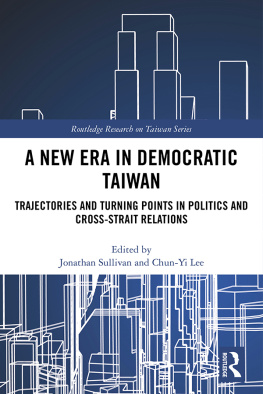

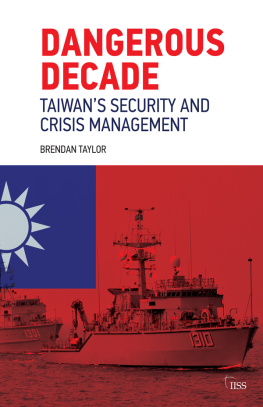
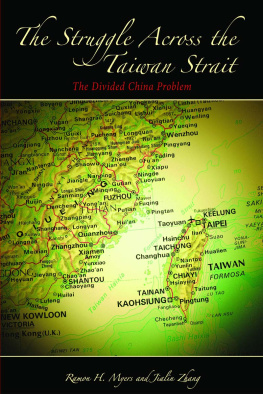
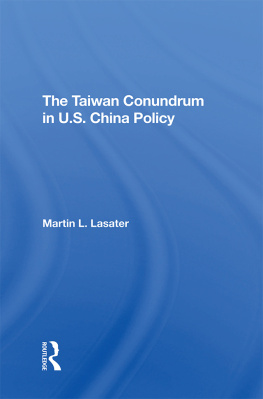

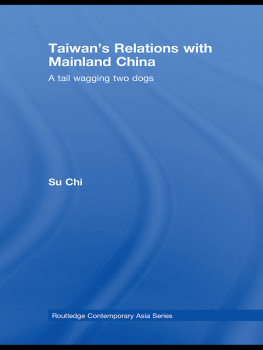
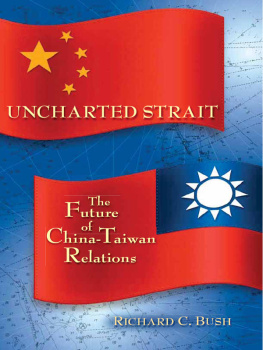

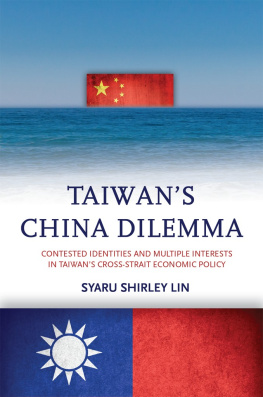
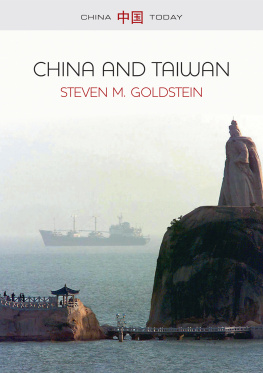
 The paper used in this publication meets the minimum requirements of American National Standard for Information SciencesPermanence of Paper for Printed Library Materials, ANSI/NISO Z39.48-1992.
The paper used in this publication meets the minimum requirements of American National Standard for Information SciencesPermanence of Paper for Printed Library Materials, ANSI/NISO Z39.48-1992.